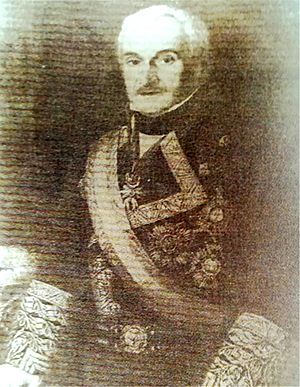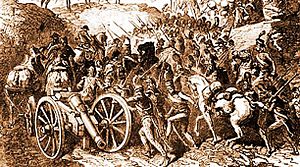Melchior Aymerich facts for kids
Melchior Aymerich (born 1754 in Ceuta, died 1836 in Cuba) was an important Spanish general and a leader in the government. He was the very last president of the Royal Audience of Quito from April to May 1822. This was a time when many countries in South America were fighting for their freedom from Spain.
Contents
Who Was Melchior Aymerich?
Melchior Aymerich was born in 1754 in a Spanish city called Ceuta. He grew up to become a high-ranking officer in the Spanish army. He was known for his military skills and his role in governing different areas.
A Leader in Quito
Aymerich was sent to the region of Quito, which is now part of Ecuador. He became the top Spanish leader there, known as the president of the Royal Audience of Quito. This was a very important job, especially during a time of big changes. Many people in South America wanted to be independent from Spain.
The Fight for Freedom
The time when Aymerich was in charge was during the Spanish American wars of independence. These were long wars where different parts of South America fought to become their own countries. Aymerich's job was to keep Quito under Spanish control.
The Battle of Pichincha
On May 24, 1822, a very important battle happened near Quito. It was called the Battle of Pichincha. Aymerich and his Spanish army fought against the rebel army led by General Antonio José de Sucre. General Sucre was a famous leader who fought for South American independence.
Aymerich's army was defeated in this battle. Two days later, on May 26, 1822, Melchior Aymerich officially gave up. This surrender meant that Spanish rule in Quito had ended. It was a big moment for the independence movement in South America.
Legacy
Melchior Aymerich is remembered as the last Spanish leader of Quito. His defeat at the Battle of Pichincha marked the end of an era. It helped pave the way for Ecuador to become an independent nation. He lived for many more years after the war, passing away in Cuba in 1836.
See also
 In Spanish: Melchor Aymerich para niños
In Spanish: Melchor Aymerich para niños
 | Charles R. Drew |
 | Benjamin Banneker |
 | Jane C. Wright |
 | Roger Arliner Young |



